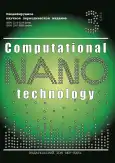Algorithm for Assessing the Effectiveness of the Process of Making Changes in Automated, Information and Telecommunication Systems
- Authors: Naumchik N.A.1
-
Affiliations:
- The Main Computing Center is a branch of JSC Russian Railways (MCC)
- Issue: Vol 10, No 3 (2023)
- Pages: 64-71
- Section: ELEMENTS OF COMPUTING SYSTEMS
- URL: https://journal-vniispk.ru/2313-223X/article/view/252166
- DOI: https://doi.org/10.33693/2313-223X-2023-10-3-64-71
- EDN: https://elibrary.ru/RLIAJN
- ID: 252166
Cite item
Abstract
The purpose of the research. The article discusses the problem of efficient use of computational resources. Describes the hardware prefetching mechanism. The purpose of the study is to find a solution that provides the ability to evaluate the quantitative use of the memory area in a computer program. This, in turn, is necessary to improve the efficiency of using the hardware capabilities of the computer. Results. As a result of the study, the author comes to the conclusion that the desired solution is an algorithm for determining the intensity of access to data structures in a computer program. The article presents the terminology that explains the name of the indicators used in the algorithm, describes the mathematical model for calculating the indicator and its limitations. A system of equations expressing the range of values of the data access intensity indicator was formulated. A three-dimensional model and two two-plane graphs were constructed to obtain a complete picture of the perception of the range of values. A detailed description of the algorithm and the presented mathematical model of the final and intermediate calculations allow us to develop an automated solution for certain tools (for example, compilers) used in the development of a computer program. The author concludes that the obtained indicator provides a quantitative representation of the use of shares of information (data areas) in a computer program for the subsequent assessment of the effectiveness of the computer program and the data structures used. Based on the results of the assessment, decisions can be made on the conformity / non conformity of the proposed solution and the need to modify the computer program or the data structures used.
Full Text
##article.viewOnOriginalSite##About the authors
Nikolay A. Naumchik
The Main Computing Center is a branch of JSC Russian Railways (MCC)
Author for correspondence.
Email: nickolay47@yandex.ru
Information Systems consultant
Russian Federation, MoscowReferences
- Adizes I.K. Change management without shocks and conflicts. In: Methodology of Adizes. Moscow: Alpina Publisher LLC, 2023.
- Badanova N.M. Information culture of personality in the context of traditions and innovations of modern society. Society: Philosophy, History, Culture. 2018. No. 8 (52). Pp. 66–69. (In Rus.)
- Laminina O.G. Social aspects of informatization of the Russian society. Humanitarian, Socio-economic, Social Sciences, 2015. No. 10–2. Pp. 183–186. (In Rus.)
- Iskolny B.B., Maksimov R.V., Sharifullin S.R. Assessment of the survivability of distributed information and telecommunication networks. Cybersecurity Issues. 2017. No. 5 (24). Pp. 72–82. (In Rus.) URL: https://cyberrus.com/wp-content/uploads/2018/02/72-82-524-17_8.-Iskolnyy. pdf
- GOST R 27.102–2021 Reliability in technology. Object reliability. Terms and definitions. Order No. 1104-st of the Federal Agency for the Technical Regulation of Metrology dated October 8, 2021. Date of introduction 01.01.2022.
- Kostyukov A.A. Criteria and means for assessing the quality of functioning of a distributed information processing system. 2016. No. 28. Pp. 11–16. (In Rus.) URL: https://cyberleninka.ru/article/n/kriterii-i-sredstva-otsenki-kachestva-funktsionirovaniya-raspredelennoy-sistemy-obrabotki-informatsii/viewer
- Egorov S.A., Egorova N.E. Partial indicators of reliability. In: Methodical instructions for practical exercises. Ivanovo: IGTA, 2011. URL: ttps://ivgpu.ru/images/docs/ob-universitete/instituty-fakultety-kafedry/ti/fakultety-kafedry/fma/tmo/method/tmp14.pdf?ysclid =lerjxu5t3735221748
- Abramov A.V., Goldovsky J.M., Safonova I.E., Telnov G.G. Educational program “Representation of information in a computer”. Innovative, Information and Communication Technologies. 2016. No. 1. Pp. 371–374. URL: https://www.elibrary.ru/download/elibrary_27332448_40543038.pdf
- Afonin I., Kabachnik D. Modern processor architectures. In: Modern automation technologies. Moscow: LLC «STA-PRESS» (Moscow), 2020. Pp. 100–102. URL: https://www.advantix–pc.ru/upload/iblock/f7b/Sovremennye–protsessornye–arkhitektury.pdf
Supplementary files








